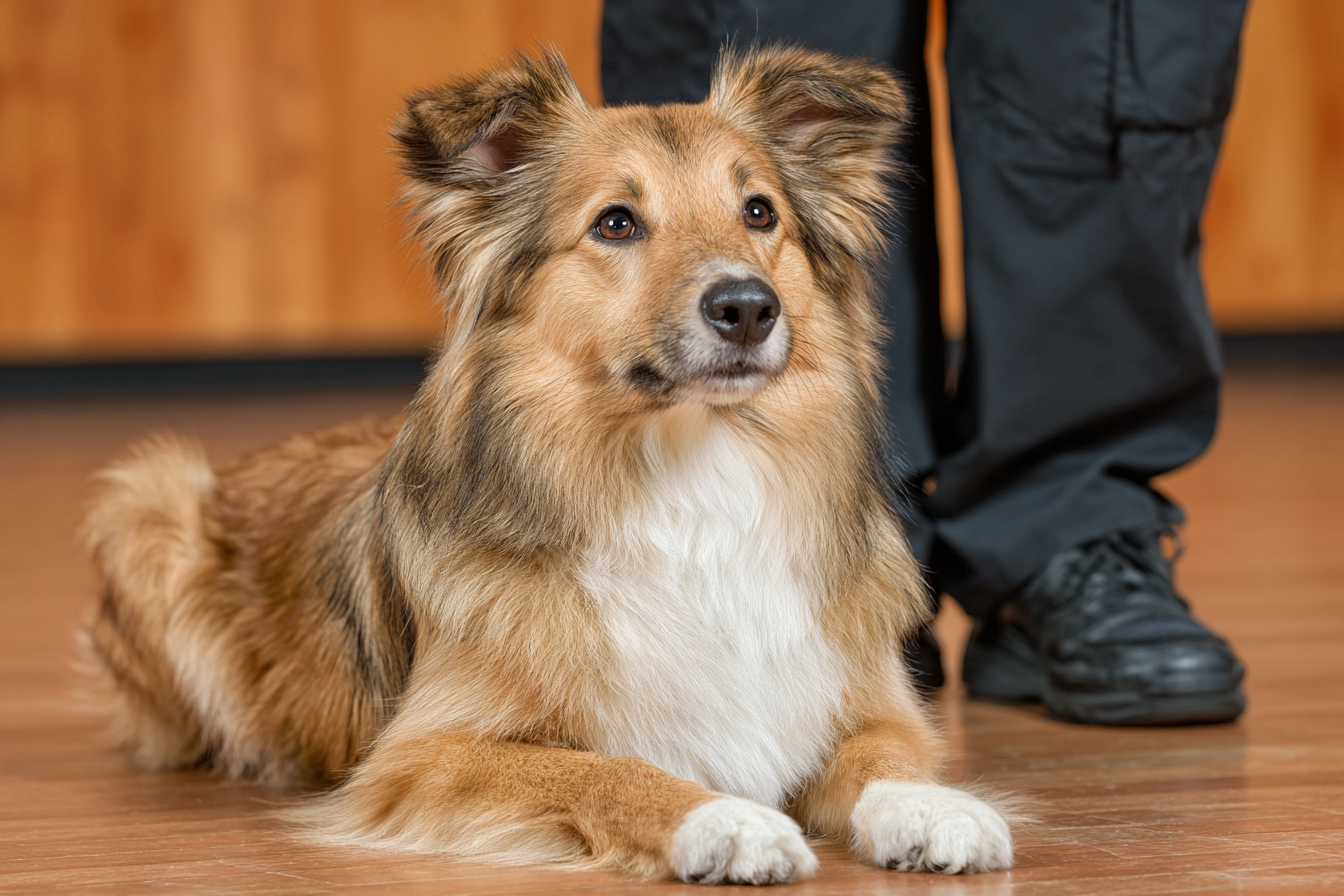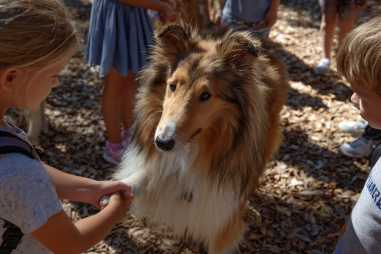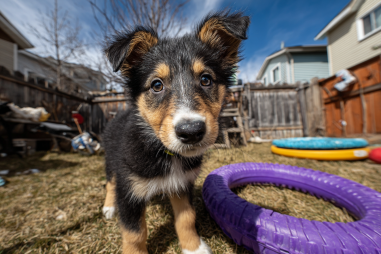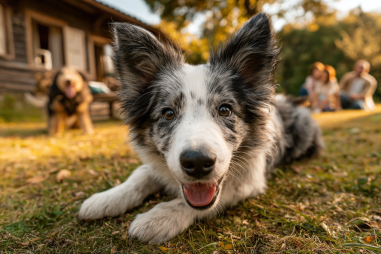Collies are known for their intelligence, loyalty, and energetic nature, making them wonderful companions for active families and individuals. However, like any breed, Collies can exhibit behavior problems that challenge even the most experienced dog owners. Understanding these issues and how to address them can help ensure a happy, well-adjusted pet and a harmonious home environment. In this article, we’ll explore common Collie behavior problems, their underlying causes, and practical solutions designed to help your Collie thrive.
Understanding Collie Temperament and How It Influences Behavior
Collies are a herding breed originally developed to manage livestock, which means they are naturally energetic, intelligent, and eager to work. Their loyal and protective nature also means they form strong bonds with their families and can be sensitive to changes in their environment. These characteristics shape much of their behavior, both positive and challenging.
The strong herding instinct, for example, can sometimes translate into chasing or nipping at people or other animals. Their high energy levels require ample physical and mental stimulation, or else they may become bored and frustrated, leading to undesirable behaviors like excessive barking or destructive chewing. Collies are also known to be quite vocal, which is a trait stemming from their watchdog heritage.
Understanding your Collie’s natural temperament is the first step toward managing and guiding their behavior effectively. Recognizing that certain behaviors are rooted in their breed traits can help you tailor training and management strategies that work with, rather than against, their instincts.
Common Collie Behavior Problems
While every dog is an individual, several behavior problems tend to appear more frequently in Collies due to their temperament and instincts. These issues can range from minor nuisances to significant challenges requiring professional intervention.
Excessive Barking
Collies are naturally vocal and use barking to communicate a variety of messages, including alerting their owners to strangers, expressing excitement, or even signaling boredom. However, when barking becomes excessive, it can cause frustration and stress for both the family and neighbors.
Herding and Chasing Behavior
Instinctual herding behaviors can sometimes manifest as chasing cars, children, or other pets. While these are natural actions for a Collie, they can become problematic or even dangerous, especially if your dog is nipping or grabbing at ankles.
Separation Anxiety and Nervousness
Collies often form very close bonds with their owners, which can lead to anxiety when left alone. Symptoms might include whining, destructive chewing, or attempts to escape. This emotional sensitivity can make them prone to stress-related behaviors if not properly managed.
Identifying the Causes Behind Behavior Problems
Before implementing solutions, it’s essential to identify what triggers your Collie’s behavior problems. Often, the root causes are linked to unmet physical or mental needs, environmental stressors, or lack of appropriate training.
For example:
- Excess Energy: Insufficient exercise can lead to pent-up energy that manifests as barking, chewing, or hyperactivity.
- Lack of Mental Stimulation: Boredom may cause dogs to seek entertainment elsewhere, sometimes destructively.
- Fear or Insecurity: Anxiety-related problems often stem from fear of separation or change in routine.
- Unclear Boundaries: Inconsistent training may cause confusion, leading to unwanted behaviors as your Collie tests limits.
Identifying these causes will guide your approach to training and management, enabling you to address the root rather than just the symptoms.
Effective Training and Management Strategies
Collies are highly intelligent and eager to please, which makes training a rewarding experience when approached with patience and consistency. Here are some proven strategies:
- Provide Regular Physical Exercise: Daily walks, agility training, or play sessions can help burn off excess energy and reduce problem behaviors.
- Mental Enrichment Activities: Puzzle toys, scent games, or obedience exercises keep their minds engaged and help alleviate boredom.
- Positive Reinforcement Training: Reward-based training methods encourage desirable behaviors without causing fear or anxiety.
- Teach Quiet Commands: Training your Collie to respond to cues such as “quiet” or “enough” can control excessive barking.
- Redirect Herding Urges: Channel their instinct through controlled activities like fetch or herding classes rather than allowing chasing or nipping.
- Establish Consistent Routines: Predictability can comfort anxious dogs and reduce stress-induced behaviors.
- Crate Training and Safe Spaces: Providing a secure area can help manage separation anxiety and offer a refuge during stressful times.
When to Seek Professional Help
Some behavior problems may persist despite your best efforts. If your Collie displays aggression, extreme anxiety, or behaviors that pose a danger to themselves or others, consulting a professional is a wise choice.
Qualified dog trainers, behaviorists, or veterinarians who specialize in canine behavior can offer tailored advice and treatment plans. In some cases, behavioral therapy combined with medication may be necessary to manage anxiety or other complex issues effectively.
Early intervention is key, so don’t hesitate to seek help at the first signs of serious behavior challenges.
Preventing Future Behavior Problems
Prevention is often easier than correction. By addressing your Collie’s physical and emotional needs early on, you can minimize the chance of behavior issues developing.
- Socialize your Collie from puppyhood with a variety of people, animals, and environments.
- Maintain a consistent training schedule to reinforce good habits.
- Monitor your dog’s behavior and environment closely for signs of stress or boredom.
- Keep exercise and mental stimulation balanced as your dog grows and ages.
Taking proactive steps helps build a confident, well-adjusted dog who is less likely to develop problematic behaviors down the road.
Encouraging Positive Behaviors in Your Collie
One of the most rewarding parts of owning a Collie is seeing them thrive and exhibit the best of their breed traits. Encouraging positive behavior creates a stronger bond between you and your dog while making day-to-day life more enjoyable.
- Use Rewards Wisely: Treats, praise, and playtime can reinforce good behaviors and motivate your dog.
- Keep Training Fun and Varied: Avoid monotony by mixing up commands and activities to maintain your Collie’s interest.
- Practice Patience and Consistency: These are key to long-term success and to building trust.
- Focus on Problem Prevention: Reward calm, quiet behaviors and redirect unwanted actions immediately.
- Recognize and Celebrate Progress: Every step forward is worth acknowledging, encouraging continued learning and growth.
Positive reinforcement and a loving approach help your Collie feel secure and eager to learn, shaping a behaviorally healthy canine companion.
A Happy Life with Your Collie Awaits
Collies are intelligent, sensitive, and energetic dogs who offer immense loyalty and companionship. While behavior problems can arise, understanding your dog’s unique needs and working proactively to address challenges will strengthen your bond and ensure a joyful partnership.
Whether it’s managing barking, redirecting herding instincts, or calming anxiety, the right combination of training, exercise, and professional support can transform challenges into opportunities for growth. Your beloved Collie deserves nothing less than the care and guidance to live its happiest, healthiest life by your side.







